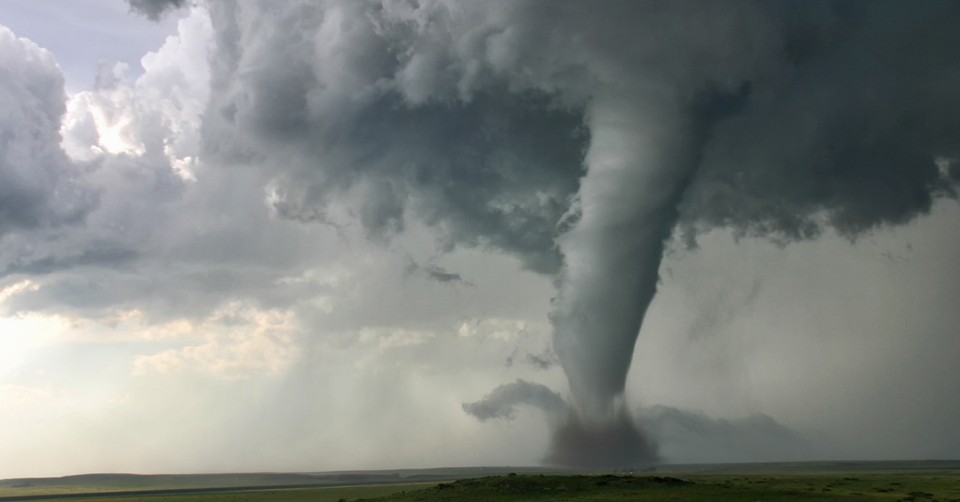4 Ways to Praise God Through Natural Disasters

The first natural disaster we read about in the history of the world is the flood in Noah’s time.
The Trinity saw the sin-filled world and knew the only way to keep iniquity from spreading further was to destroy everything. Everything except the one righteous man and his family who trusted and acknowledged Him.
Of course, because of the fallen nature of man, transgressions were not eliminated. Later, God had to produce another way to halt the spread of evil through the destruction of Sodom and Gomorrah.
The Lord had to preserve humanity so that there would be a human line pure enough for His Son to be born into for the purpose of redemption.
When Adam and Eve introduced sin into the world, the planet also experienced a curse. Thorns, weeds, and hardened ground that wouldn’t grow anything came into existence.
The earth groans to be released from this curse. Because of this, we experience weather and planetary crises today in many forms.
Atmospheric differences cause tornadoes and hurricanes which produce floods and high winds. Tectonic plates shift which cause earthquakes and tsunamis. Lack of moisture in the air brings about droughts and wildfires.
We know that the whole creation has been groaning as in the pains of childbirth right up to the present time. (Romans 8:22 NIV)
We can lose hope if our attention is only focused on the catastrophes before us.
Here are 4 ways we can praise God through these natural disasters:
1. Realize Disasters Are Not Acts of God
Each time a tragedy happens, there are groups of people who start spouting that God is judging whatever city was targeted by the calamity. Even contracts and insurance policies blame Him for any event in nature as “acts of God.”
If the Almighty Lord were judging mankind through tragedies and other events, why would He stop at a certain city or region? Evil exists all over the world.
Since we have now been justified by his blood, how much more shall we be saved from God’s wrath through Him! (Romans 5:9)
Sin does need to be judged and it has been through Christ. God hasn’t changed. But He poured that wrath upon Christ instead of sinners. We are in a period of grace, but that doesn’t mean that people are not responsible for their own actions (Romans 2:5). There are still consequences to living in disobedience and each person needs to accept the Savior’s sacrifice. The Great Judge is giving the world time to repent and turn to Him before He does inflict punishment again. There will be a final recompense but up until that time comes, we are extended His grace and mercy.
For God did not appoint us to suffer wrath but to receive salvation through our Lord Jesus Christ. (1 Thessalonians 5:9)
We can be thankful these adversities are not punishment sent to us. They are natural reactions to changes on this big, blue marble we live on.
2. Compassionate People Come Together with Aid
When destruction hits, Christian organizations are quick to respond. Volunteers travel across states to provide assistance to those who have experienced devastation.
If anyone has material possessions and sees a brother or sister in need but has no pity on them, how can the love of God be in that person? Dear children, let us not love with words or speech but with actions and in truth. (1 John 3:17-18)
Although not everyone has experienced a weather hazard that wiped out their entire life’s possessions, we all can relate to what it feels like to go through bad times. We want to help others get their lives back together as much as possible. We know we would welcome the same helping hand if we were in the same situation.
God has placed the desire to reach out to our fellow man into our hearts. We can thank Him for the help He provides through other people.
And do not forget to do good and to share with others, for with such sacrifices God is pleased. (Hebrews 13:16)
3. The Earth Gets Renewed
The Creator put into this planet the ability to heal itself. Wildfires are destructive and dangerous, but once they are quenched, the land begins to grow again. New vegetation sprouts and forests are green once more in just a few years.
For this is what the Lord says—he who created the heavens he is God; he who fashioned and made the earth, he founded it; he did not create it to be empty, but formed it to be inhabited—he says: “I am the Lord, and there is no other.” (Isaiah 45:18)
Mount St. Helens in the Pacific Northwest area of the United States blew the top of the mountain off spewing out ash and lava in 1980. But the ecological system of that area is now alive with vegetation and wildlife habitations.
While the earth remains, seedtime and harvest, cold and heat, summer and winter, day and night will never cease. (Genesis 8:22)
While the destruction of homes and forests is devastating, we can be thankful that the land doesn’t stay dormant and empty.
4. Praise Him Because He Is Lord
Give thanks in all circumstances; for this is God’s will for you in Christ Jesus. (1 Thessalonians 5:18)
Sometimes this verse is quoted with the intent that we are to thank God for everything that happens. But this scripture says to give thanks IN all things not BECAUSE of all things. No matter what happens we can praise Him because we have a Father who cares and gives us a way to be rescued.
Because of the tragedy in the Garden of Eden, Satan became the ruler of this world and thus the blighted ground. He is the author of destruction (John 10:10). Our Father is a restorer, not a destroyer.
When we praise God no matter what happens, we show that we have faith in Him to take care of our needs and heal our hurts.
He also tells us that we can speak to our mountain, whatever that may be, and if we have the faith of a mustard seed, that mountain will be removed (Mark 11:23-24). There are many instances of faith-filled people praying and taking authority over weather patterns that were headed their way, and casualties were averted.
Last year, radar determined a tornado was on a path toward our house. It was on the ground and cutting a swath of destruction with each twist. We prayed and stood on the scripture in Mark 11 and the funnel cloud raised up from the ground before it arrived where we lived.
Praising the Lord brings power over situations and puts the devil in his place. The fallen angel cannot stand to have the Sovereign of the universe praised.
Lessons Learned from the Past
We would all like to avoid any future universal plagues, but through the events of the past, science and technology have found ways to improve warning systems.
After Hurricane Katrina hit the Louisiana coast, higher levees were built to protect against the mighty Mississippi River’s boundaries. Doppler Radar continues to improve ways to warn people in the path of tornadoes, and sensitive seismometers detect movement in the globe’s crust to predict earthquakes so residents can flee to places of safety.
These instruments are the creative inventions from the mind of mankind. The Creator gave us the intelligence to know how to inhabit this revolving orb safely.
Natural disasters will be a part of this afflicted sphere until Jesus restores it to a new habitation (Revelation 21:1). Until then we can praise Him that He has given us wisdom, direction, and protection when we stand on His Word.
If you say, “The Lord is my refuge,” and you make the Most High your dwelling, no harm will overtake you, no disaster will come near your tent. (Psalm 91:9-10)
Photo Credit: ©Getty Images/Jason Persoff Stormdoctor

Her book, Redemption, the Heartbeat of Christmas: What the Birth of Christ Means to the World, was released in October 2025. She loves coffee, a good book, and gardening, which would be more fun if not for the weeds. Barbara and her husband enjoy life with two sons, one daughter-in-love, and an energetic granddaughter who keeps these retired people on their toes.
She writes about living in our identity in Christ at https://barbaralatta.blogspot.com/. You can follow Barbara on Facebook: Barbara Latta, author; X @barbaralatta; and Instagram blatta2.
Originally published July 12, 2021.







